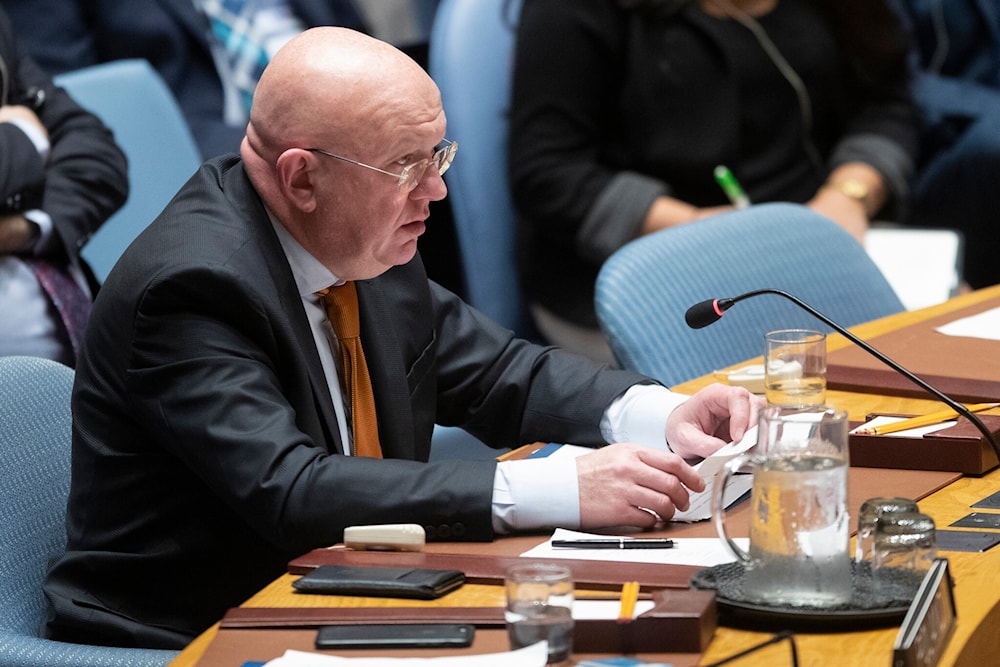They are Russian regions, not occupied Ukrainian lands: Russia UN Rep.
Russia's ambassador to the United Nations says that Russia "did not start the war" but "came to stop it."
-

Russian Ambassador to the United Nations Vassily Nebenzia speaks during a Security Council meeting on the situation in Syria held in the UN's headquarters on Thursday, October 24, 2019. (AP)
Russia’s permanent envoy to the United Nations rejected accusations that Russia is occupying Ukrainian territory, stressing that they are "Russian regions" after the regions in question voted in favor of joining the federation.
A UN General Assembly session on the war marking its second year saw Kiev and its Western allies condemning Russia's "occupation" of Ukrainian lands. Addressing the attendees, Vassily Nebenzia said: “In reality, there is no such thing as temporarily occupied territories of Ukraine. They are Russian regions."
Read more: What targets did EU's 13th anti-Russia sanctions package aim at?
Nebenzia added that Crimea, the Donetsk and Lugansk People’s Republics, and the regions of Kherson and Zaporozhye became part of Russia following “the legitimate expression of the will of their people.”
'Ukraine has completely failed'
The Russian diplomat said that Western countries continue to push Ukraine to a dead end, and that time is not in favor of the country's people, noting that his country "did not start this war" but "came to finally stop it."
"All Kiev had to do was to respect the rights of the people and allow them to live peacefully, receive education in their native language and have the freedom of religion and the freedom of thought,” Nebenzia said.
Meanwhile, "Ukraine has completely failed, while the West continues to pump weapons into the country and to discuss dead-end peace prospects," he said.
Read more: Zelensky: Ukraine facing difficult frontline battles
"For the people of Ukraine, it’s increasingly clear how ineffective its government is and how much it lacks independence," he continued, adding: "In this proxy war…Ukraine is losing."
For his part, Ukraine's UN representative said that Ukraine will "win the war" with Russia after it "survived the invasion."
“If we act collectively and jointly, this will happen sooner rather than later," Dmytro Kuleba said.
Read more: Zelensky urges swift deliveries of air defense systems, fighter jets
Failed to succeed
The United States announced sanctions against Russia on Friday targeting over 500 parties and entities to mark the second anniversary of the start of the war in Ukraine.
The sanctions, described as the largest single tranche since the start of the war, also come in response to the death of Russian opposition figure Alexei Navalny.
However, the success of Washington's policy on Russia remains questionable.
A report by the New York Times last week signaled that in the two years since the Ukraine war began, the collective West has effectively failed to isolate Russia.
According to the report, despite facing condemnation from international bodies like the International Criminal Court and the United Nations, Russian President Vladimir Putin's hold on power remains firm, supported by Russia's vast oil and natural gas supplies, which fuel its resilience in the face of Western opposition.
Read more: Ecuador refuses US plan to use 'scrap' weapons in war in Ukraine
While the Biden administration claims Moscow is more isolated than ever and has suffered strategic setbacks due to the war, evidence suggests otherwise.
Russia has strengthened economic and diplomatic ties with countries like China, India, Brazil, and Gulf states, which have increased purchases of Russian oil and deepened diplomatic relations. This boosted the Russian economy to grow by more than three percent last year and is expected to grow again this year.
"There is no way Russia is locked in," Michael Kimmage, a Cold War historian, told NYT. "He is not limited economically or diplomatically and conveys his message about the war."

 4 Min Read
4 Min Read










